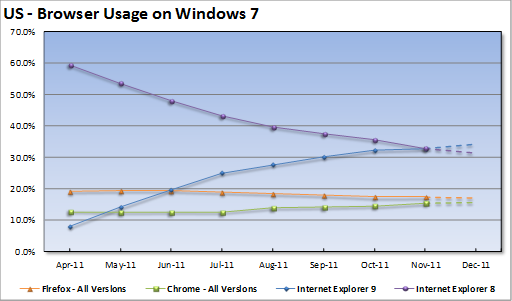IE9 makes gains on Windows 7

Microsoft's Internet Explorer 9 could soon be the third most popular web browser, in spite of the fact that it's only available on Windows 7 and Vista. According to NetApplications figures for browser market shares, published today, IE9 now has 11.48 percent of the global market, and is closing in on second-placed Firefox 8, which has 12.28 percent. However, IE8 remains the market leader, with a 27.43 percent market share, as measured by logging visits to web sites by personal computers.
The December rankings are skewed because Google is currently upgrading users from version 15 (8.71 percent) to version 16 (7.07 percent) of its Chrome browser. Since Google more or less forces upgrades, Chrome 16 should soon have a market share of 16+ percent putting it in second place, ahead of both IE9 and Firefox 8.
 PC browser market shares in December 2011, according to MetMarkshare
PC browser market shares in December 2011, according to MetMarkshare
On December 30, Microsoft's Windows Team blog announced that: "As of November, IE9 usage share on Windows 7 worldwide was higher than all versions of Chrome and all versions of Firefox – second only to IE8. Based on where the December data currently stands, we’re pleased to say IE9 is still following that trajectory and will soon take the top spot from IE8 on Windows 7, with usage share expected to come in at nearly 25.6 percent this month."
 Source: Microsoft
Source: Microsoft
Microsoft also suggested that, in the USA, IE9 would already be ahead of IE8 in December. However, NetApplications market share numbers for geographical areas and different operating systems are only available to paying customers, such as Microsoft. They are not published on the NetMarketshare website.
Microsoft took a big risk by not developing a version of IE9 for the decade-old Windows XP operating system, which still has a large market share. XP users could easily defect to Chrome or Mozilla Firefox instead of upgrading to Windows 7. However, Microsoft decided to bet on the rapid development of IE9, IE10 (which will appear in Windows 8) and future versions rather than invest in XP, which is clearly in terminal decline. The Windows Live Essentials 2011 suite, which includes Microsoft email and messaging applications, similarly does not run on XP.
IE9 does not ship with a version of Windows, so users have to download it. However, Microsoft has noted the lack of protest against Google's much more aggressive approach, and Mozilla's move in the same direction (ie silent updating with Firefox 10), so it will now try to push IE9 a bit harder.
On the Windows Team blog on December 15, Internet Explorer Business and Marketing manager Ryan Gavin announced plans "to automatically upgrade Windows customers to the latest version of Internet Explorer available for their PC". (For Windows XP users, this is IE8, which doesn't have adequate HTML5 support for many websites.)
Gavin said Microsoft would start offering browser upgrades in January to "customers in Australia and Brazil who have turned on automatic updating via Windows Update". If the approach proves successful in these countries, it will be rolled out globally.
Of course, upgrades can always be declined or blocked, and Microsoft offers an Internet Explorer 9 Blocker Toolkit.
Gavin adds: "One of the things we’re committed to as we move to auto updates is striking the right balance for consumers and enterprises – getting consumers the most up-to-date version of their browser while allowing enterprises to update their browsers on their schedule."
For more details, see Stuart Rose's post, IE Auto Updates: Good News for Businesses Too.
Although most companies -- especially Microsoft -- would like to see obsolete copies of IE disappear to remove the need for website compatibility workarounds, the IE9 upgrade is being pushed mainly for its security benefits. Gavin says:
"We want to make updating to the best protection possible as fast and simple as we can for Windows customers. IE is how millions of Windows customers connect to the Web, so keeping that part of Windows updated at all times is critical to keeping them safe online. With automatic updates enabled through Windows Update, customers can receive IE9 and future versions of Internet Explorer seamlessly without any 'update fatigue' issues."